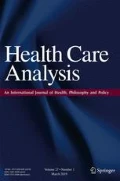Abstract
The commercial trading of human organs, along withvarious related activities (for example, advertising)was criminalised throughout Great Britain under theHuman Organ Transplants Act 1989.This paper critically assesses one type of argumentfor this, and similar, legal prohibitions:commodification arguments.Firstly, the term `commodification' is analysed. Thiscan be used to refer to either social practices or toattitudes. Commodification arguments rely on thesecond sense and are based on the idea that having acommodifying attitude to certain classes of thing(e.g. bodies or persons) is wrong. The commodifyingattitude consists of three main elements: denial ofsubjectivity, instrumentality, and fungibility.Secondly, in the light of this analysis, the claimthat organ sale involves commodifying the human bodyis examined. This claim is found to be plausible butinsufficient to ground an argument against organ sale,because the very same commodifying attitude is likelyto be present in cases of (unpaid) organ donation. Itis also argued that commodifying bodies per semay not be wrong.Thirdly, the view that organ sale involvescommodifying persons is examined. Although this andthe claim that it is wrong to commodify persons areprobably true, there is – it is argued – littlereason to regard organ sale as worse in this respectthan other widely accepted practices, such as thebuying and selling of labour.The conclusion is that although commodification is auseful ethical concept and although commodificationarguments may sometimes be successful, thecommodification argument against organ sale is notpersuasive. This is not to say, though, that thereare no arguments for prohibition – simply that thisparticular justificatory strategy is flawed.
Similar content being viewed by others
References
Anderson, E. (1990) Is Women's Labour a Commodity? Philosophy and Public Affairs 19, 71–92.
Andrews, L. (1986) My Body, My Property. Hastings Centre Report 16, 28–38.
Audi, R. (1996) The Morality and Utility of Organ Transplantation. Utilitas 8, 141–158.
Becker, C. (1999) Money Talks,Money Kills - the Economics of Transplantation in Japan and China. Bioethics 13, 236–243.
Brecher, B. (1990) The Kidney Trade: Or, the Customer Is Always Wrong. Journal of Medical Ethics 16, 120–123.
Brecher, B. (1994) Organs for Transplant: Donation or Payment? In R. Gillon (Ed.), Principles of Health Care Ethics (pp. 993–1002). Chichester: John Wiley & Sons.
Chadwick, R. (1989) The Market for Bodily Parts: Kant and Duties to Oneself. Journal of Applied Philosophy 6, 129–139.
Childress, J. (1992) The Body as Property: Some Philosophical Reflections. Transplantation Proceedings 24, 2143–2148.
Daar, A. (1998) Paid Organ Donation: The Grey Basket Concept. Journal of Medical Ethics 24, 365–368.
Erin, C. and Harris, J. (1994) A Monopsonistic Market; or How to Buy and Sell Human Organs, Tissues and Cells Ethically. In I. Robinson (Ed.), Life and Death Under High Technology Medicine (pp. 134–152). Manchester: Manchester University Press.
Freeman, M. (1996) Taking the Body Seriously? In K. Stern and P. Walsh (Eds), Property Rights in the Human Body. London: King's College London, Centre of Medical Law and Ethics (Occasional Paper 2).
Gerrand, N. (1994) The Notion of Gift-Giving and Organ Donation. Bioethics 8, 127–150.
Gerrand, N. (1999) The Misuse of Kant in the Debate About a Market in Human Bodily Parts. Journal of Applied Philosophy 16, 59–67.
Gillon, R. (1997) Commerce and Medical Ethics. Journal of Medical Ethics 23, 67–8.
Harris, J. (1985) The Value of Life. London: Routledge.
Harvey, J. (1990) Paying Organ Donors. Journal of Medical Ethics 16, 117–119.
Kass, L. (1985) Thinking About the Body. Hastings Centre Report 15, 20–30.
Keown, J. (1997) The Gift of Blood in Europe: An Ethical Defence of EC Directive 89/381. Journal of Medical Ethics 23, 96–100.
Kymlicka, W. (1991) Rethinking the Family. Philosophy and Public Affairs 20, 77–97.
Land, W. and Dossetor, J. (Eds) (1991) Organ Replacement Therapy: Ethics Justice, Commerce. Berlin: Springer-Verlag.
Manga, P. (1987) A Commercial Market for Organs? Why Not. Bioethics 1, 321–338.
Marshall, S. (1999) Bodyshopping: The Case of Prostitution. Journal of Applied Philosophy 16, 139–150.
Mason, J. and McCall Smith, R. (1999) Law and Medical Ethics (5th edn.). London: Butterworths.
McHale, J. and Fox, M. (Eds) (1997) Health Care Law. London: Sweet & Maxwell.
Munzer, S. (1993) Kant and Property Rights in Body Parts. Canadian Journal of Law and Jurisprudence 6, 319–341.
Nussbaum, M. (1995) Objectification. Philosophy and Public Affairs 24, 249–291.
Radcliffe-Richards, J. (1996) Nephrarious Goings On: Kidney Sales and Moral Arguments. Journal of Medicine and Philosophy 21, 375–416.
Radcliffe-Richards, J. et al. (1998) The Case for Allowing Kidney Sales. The Lancet 351, 1950–1952.
Radin, M. (1987) Market-Inalienability. Harvard Law Review 100, 1849–1937.
Resnik, D. (1998) The Commodification of Human Reproductive Materials. Journal of Medical Ethics 24, 388–393.
Teo, B. (1992) Is the Adoption of More Efficient Strategies of Organ Procurement the Answer to Persistent Organ Shortage in Transplantation? Bioethics 6, 113–129.
Warnock, M. et al. (1984) Report of the Committee of Enquiry into Human Fertilisation and Embryology.
Wilkinson, S. and Garrard, E. (1996) Bodily Integrity and the Sale of Human Organs. Journal of Medical Ethics 22, 334–339.
Author information
Authors and Affiliations
Rights and permissions
About this article
Cite this article
Wilkinson, S. Commodification Arguments for the Legal Prohibition of Organ Sale. Health Care Analysis 8, 189–201 (2000). https://doi.org/10.1023/A:1009454612900
Issue Date:
DOI: https://doi.org/10.1023/A:1009454612900


